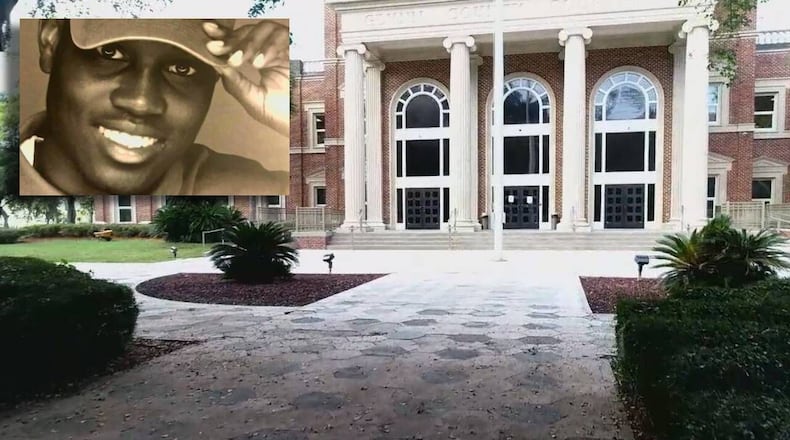BRUNSWICK — The judge overseeing the trial of the three men charged in Ahmaud Arbery’s 2020 shooting death expressed frustration Tuesday at the pace of jury selection.
Superior Court Judge Timothy Walmsley had a panel of 20 prospective jurors scheduled to appear in court in the early afternoon, but he sent them home before lunch because questioning of the prior panel was far from finished.
“I do not have the ability to just store people or keep them longer than planned,” Walmsley said. “I am not comfortable with this. At the rate we’re going, all these plans we have to move these panels through are not going to work.”
After two long days of jury selection, the court qualified eight people to be members of the group from which the jury will be seated. Attorneys say they’re looking to qualify either 64 or 68 potential jurors before whittling that down to 12 jurors and four alternates ahead of opening statements.
Eight prospective jurors remained after Monday’s selection process, but they have yet to be questioned individually.
The court initially hoped to gather two panels of 20 potential jurors per day through the end of next week. Given the slow pace of individual questioning, however, Walmsley decided he would empanel one group of jurors each morning going forward.
With the Feb. 23, 2020, killing having received so much publicity locally and nationally, many experts following the case expected jury selection to creep along. The unstated goal was to seat a jury within two weeks, but that process could take longer.
It’s clear from the first two days of jury selection that just about every prospective juror summoned was familiar with the case to some degree, and several raised their hands when asked if they knew anyone involved.
Many said they had already made up their minds that Travis McMichael, who killed Arbery with three shotgun blasts; his father Greg McMichael, a former District Attorney’s Office investigator; and William “Roddie” Bryan, who took the cellphone video of the killing, are guilty as charged.
One prospective juror, a Black man who said he had participated in racial justice demonstrations, told the court he believed the McMichaels and Bryan should be convicted on all counts. He was quickly dismissed.
Another woman told the court she knew Arbery’s father, Marcus Arbery. She was ultimately dismissed because she had prior felony convictions and had not had her voting rights restored. One man, a security contractor hoping to join the Glynn County Police Department, said his father is a longtime prosecutor who worked for former District Attorney Jackie Johnson and is friends with Greg McMichael.
”He’s a friend of my father’s and he’s been over to our house multiple times,” the man said.
The man said he doesn’t know Travis McMichael or Bryan personally, but that Jackie Johnson had also been over to their home “on a number of occasions.” That juror was among those qualified on Tuesday — and will likely be struck by the prosecution when the jury is chosen.
Johnson, the former DA, was ousted in last year’s election and later indicted over her alleged mishandling of the case. Prosecutors argue that she helped protect Travis McMichael and his father, who had worked as an investigator in her office.
One prospective juror, a food scientist who lives on St. Simons Island, said he had accessed court filings in the high-profile case. That information came courtesy of the Glynn County Clerk’s Office.
The office included links to the court records for all three defendants on its website that told prospective jurors when to report to duty. Anyone clicking on those links could access all court motions, including those detailing Arbery’s past brushes with the law and his mental health diagnosis — evidence Walmsley has ruled inadmissible.
Both the prosecution and defense brought that up late Tuesday. Bob Rubin, one of the attorneys representing Travis McMichael called it “inexplicable.”
Walmsley said he would speak with the clerk and try to get the links taken off the jury selection page and redirected to another section of the website.
The food scientist, who graduated from Auburn University, said he had “actively researched” the case and had seen the cellphone video of the fatal shooting “a couple of times.”
“I’m still leaning one way or the other,” he told prosecutor Linda Dunikoski. “I just don’t know what kind of evidence is going to presented.”
That prompted Rubin to tell the juror it sounded like he could be fair and balanced toward both sides.
“I’m not really sure that’s where I am,” the juror replied. “Someone was murdered. That’s all I know.”
Walmsley dealt a blow to the defense late in the afternoon when he denied their motion to strike a juror who referred to the killing as a “hate crime.”
“I believe that it wasn’t justified what happened to Ahmaud Arbery and I don’t believe in vigilante justice,” said the woman, who works as a caterer and for a jewelry retail company. “I think if it was a white guy running through a neighborhood, I don’t think he would have been targeted as a suspect.”
The woman said she supported the Black Lives Matter movement and believed the Confederate flag was a racist symbol. She said she’s Southern, but that the “Civil War is not necessarily my heritage.”
“I think if it was a white guy running through a neighborhood, I don’t think he would have been targeted as a suspect,” the woman said during individual questioning.
Jury selection resumes Wednesday at 8:30 a.m.
Keep Reading
The Latest
Featured




